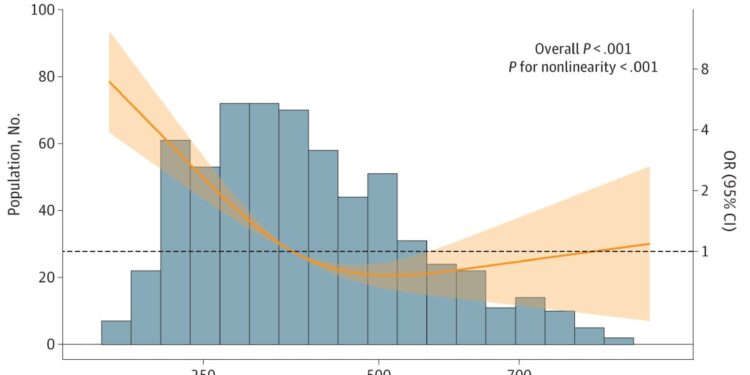Dose-response association of maternal folate, vitamin B12, and homocysteine levels with risk of congenital heart disease (CHD) in offspring. Credit: Open JAMA Network (2024). DOI: 10.1001/jamanetworkopen.2024.38747
Pregnant women with low or excessively high blood folate levels may face a higher risk of their children developing congenital heart disease, according to a study from Guangdong Provincial People’s Hospital, China.
Folate is a B vitamin essential for fetal development and recommended to prevent certain birth defects. Congenital heart disease (CHD) is the most common birth defect worldwide, affecting approximately 2.3% of births. The role of folate in preventing coronary heart disease is unclear, with previous studies yielding conflicting results. With recommendations for folate supplementation during pregnancy and folic acid fortification of many foods, folate intake is at an all-time high. These conflicting results need to be resolved.
In a case-control study, “Maternal Serum Folate During Pregnancy and Congenital Heart Disease in Offspring,” published in Open JAMA NetworkResearchers found a U-shaped relationship between maternal serum folate levels during early pregnancy and the risk of coronary heart disease in the offspring. This indicates that both low and high levels of folate are linked to an increased risk of coronary heart disease.
The study included 129 children diagnosed with coronary heart disease and 516 without. Maternal blood samples were collected around the 16th week of pregnancy to measure folate, vitamin B12, and homocysteine levels. Mothers’ serum data were grouped according to folate counts into low (25%), medium (50%), and high (25%).
Mothers in the low folate group were more than 3 times more likely to have a child with coronary heart disease than mothers in the middle group. People in the highest folate group also had an increased risk, with 1.81 times the odds of developing coronary heart disease in their children.
Folate wasn’t everything
Children born to mothers with vitamin B12 deficiency and low folate levels had a 7 times higher risk of coronary heart disease. In the high-folate group, B12 deficiency was associated with a 6-fold increased risk of coronary heart disease.
High homocysteine levels and low folate had a nearly 9 times higher risk of developing coronary heart disease and a 7 times higher risk in the high folate group.
Higher rates of high homocysteine levels accounted for about 32.9% of the association between low folate levels and increased risk of coronary heart disease, which is an interesting finding in itself. Homocysteine is an amino acid involved in a critical metabolic pathway in the body known as the methionine-homocysteine cycle. This cycle is essential for various cellular functions, including DNA synthesis, repair, and methylation.
High levels of homocysteine in the blood (outside of pregnancy) are a condition known as hyperhomocysteinemia. This condition is most often caused by insufficient levels of folate, vitamin B12, or vitamin B6.
It can also be caused by mutations in genes encoding methionine-homocysteine cycle enzymes, which lead to insufficient conversion of homocysteine to methionine. Since the normal cycle uses the B group of vitamins, one would expect high levels of folate and B12.
Excessive consumption of coffee, alcohol or smoking can increase homocysteine and high homocysteine levels are already associated with an increased risk of cardiovascular disease, including coronary heart disease and stroke in adults.
By finding low and high folate levels associated with coronary heart disease risk and even stronger correlations with low B12 levels and high homocysteine levels, the present study raises intriguing questions about the underlying mechanisms that Future research will need to resolve.
More information:
Yanji Qu et al, Maternal serum folate during pregnancy and congenital heart disease in offspring, Open JAMA Network (2024). DOI: 10.1001/jamanetworkopen.2024.38747
© 2024 Science X Network
Quote: Low and high folate levels during pregnancy linked to increased heart defects in babies (October 14, 2024) retrieved October 14, 2024 from
This document is subject to copyright. Except for fair use for private study or research purposes, no part may be reproduced without written permission. The content is provided for informational purposes only.



